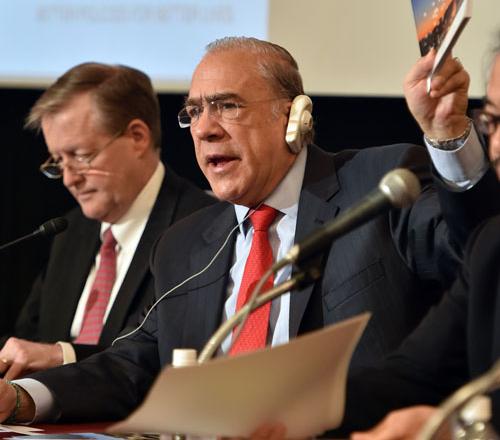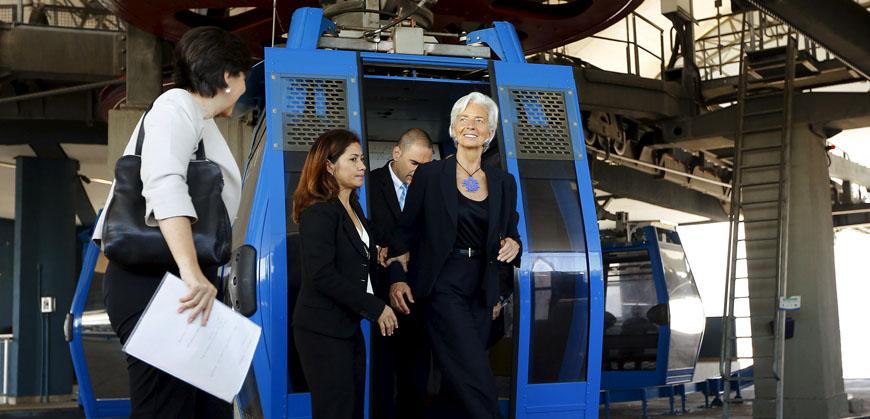RIO DE JANEIRO — Brazil has imposed a hefty 6 per cent increase on the surcharge paid by its citizens when making credit cards purchases overseas.
The increase raised the tax from 0.38 per cent to 6.38 per cent.
The tax also applies to cash withdrawals from overseas bank machines and purchases made when using travellers checks.
The measure is expected to add some $205 million to government coffers this year.
The tax also aims to reduce the amount that Brazilians spend overseas, thereby bolstering domestic industry and reducing a budget deficit which the O Globo daily said stands at $72.7 billion.
According to government figures, Brazilians spent $23.1 billion overseas between January and November of 2013, a 14 per cent increase over the same period in 2012.
Brazil may have cut the number of people living in poverty in recent years but inequality persists and better education is needed, according to the Organisation for Economic Cooperation and Development (OECD).
“Successful policies to spread the benefits of economic growth more widely have substantially reduced poverty and income inequality,” the OECD said.
In a new report, the OECD added: “Wider access to education has allowed more Brazilians to move into an expanding number of better-paid jobs.
“However, the quality of education has not kept pace with the impressive expansion of the system. There are severe shortages in physical school infrastructure,” it indicated.
Recent years of growth and the introduction of the Bolsa Familia social welfare programme has helped to lift around 40 million people out of poverty in a decade.
But the OECD lamented that the country still had to reform its bureaucracy and fiscal policies to deal with a “fragmented” tax system.
“The tax system... is characterised by a low degree of progressiveness which limits its redistributive impact,” the organisation said.
It added that barely half of the population worked in the formal economy and had access to credit.
The organisation, grouping the world’s 34 most industrialised countries, concluded: “There remains much to do. Brazil still has one of the highest levels of inequality in the world” and would take two decades to reach where the United States is today.
Separately, Brazil will shun creative accounting as it bolsters its fiscal situation in 2014 and increases transparency, Finance Minister Guido Mantega was reported as saying.
Brazil is seeking to bolster sagging growth which has suffered in the global downturn of recent years while also combating above-target inflation and low competitiveness.
But Mantega said in an interview that the government expects its fiscal position to improve as it hikes taxes.
“We did not violate any regulations but let’s say it was blurry, even confused,” Mantega told Estado de Sao Paulo newspaper.
Brazil had had to raid its sovereign fund to stay inside the limits as it struggled to respect budgetary rules in 2012.
“This is going to change. It has already changed,” Mantega said regarding the country’s accounting practices.
“All governments take measures such as ours,” by stretching the boundaries where possible as the accounting year ends and, for example, including expected dividends from state-owned firms.
“Was it wrong? No, but it was forced. So we are going to lay bare everything we are doing,” Mantega said.
Brazil was the subject of a mid-year sovereign credit downgrade warning.
But Mantega said he believed ratings agencies would maintain Brazil’s rating of BBB, the second-lowest investment grade level, even if that was placed on negative watch in 2013 by Standard & Poor’s.
Agencies are expected to hold fire pending the outcome of next October’s presidential election, which leftist incumbent Dilma Rousseff is favoured to win.
“My hypothesis is that our data will be favourable to maintain our rating,” said Mantega.
Asked if the government had the market’s confidence Mantega said Brazil had struggled to achieve a primary surplus in 2013, but would hit a $31.5 billion surplus.
A primary surplus means the government spending less than its overall revenue, albeit exluding interest payments on government debt.
Despite struggling with creaky infrastructure, “the Brazilian economy is becoming more competitive”, Mantega insisted, while noting the global crisis of the past six years had knocked growth off course everywhere, including China, with Brazilian growth of 6.1 per cent in 2007 sliding to around 2.5 now.
In the hope 2014 will see the World Cup hosts’ economy move ahead, Mantega said some taxes could rise, including the country’s Programme for Investment, allowing a scaling back of subsidies from the treasury to the state development bank.



















